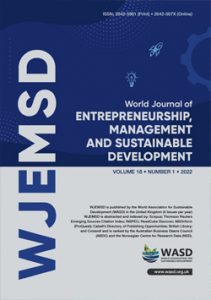A conceptual model of critical success factors for Indian social enterprises, Dr. Mir Satar and Shibu John
 Dr. Mir Shahid Satar, Shibu John
Dr. Mir Shahid Satar, Shibu John
Jamia Hamdard University, New Delhi
India
DOI: 10.1108/WJEMSD-09-2015-0042
Purpose: There have been global upsurge in the social enterprise research & practice considering social enterprise as a rapidly growing thought worldwide. The renewed significance of social enterprises (SE' s) has arisen primarily on account of their assumed potential in solving a range of social problems. The evidences supporting the budding role of SE' s in fostering sustained socio-economic development of regions & communities across globe are evolving continuously. Even though, social entrepreneurship & SE' s have remained central thought provoking domain in the realm of scholarly investigation for a past couple of decades, the emerging literature on SE' s & their role in economic development is riddled with theoretical inconsistencies & definitional controversies. Thus, very little is known about functioning & management of SE' s. For the sake of advancing the field, the purpose of this paper is to identify and analyze the critical success factors (CSF' s) of SE' s operating in different social settings in India. Further, a conceptual model is developed incorporating different factors of social enterprise operation in an integrated framework.
Design/methodology/approach: Based on the review of the extant literature, three categories of success factors comprising a total of 38 success factors for SE' s were initially identified. Under each category, the success factors were then classified and reduced to appropriate numbers based upon their importance to SE' s and their repeated manifestations in the literature, making a total of 13 CSF' s under all 3 categories. Based on these 3 categories of CSF' s, a conceptual model was developed.
Findings: The study determines thirteen critical factors as contributing to the success of social enterprises: (1) Business planning skills (2) entrepreneurship orientation; (3) leadership; (4) networking; (5) Innovative financing (6) triple bottom line planning; (7) social enterprise marketing; (8) community engagement; (9) human capital; (10) organizational culture; (11) Social Impact Evaluation (12) Frugal innovation & (13) Government support.
Originality/value: The paper presents a theoretical research model incorporating factors and determinants of social enterprise success to direct a future research agenda. The paper can further be used by researchers to empirically test critical success factors of social enterprises. Moreover, practitioners can also gain benefits from the conceptual framework & promote social entrepreneurship.
Citation: Satar, M.S. and John, S. (2016), "A conceptual model of critical success factors for Indian social enterprises", World Journal of Entrepreneurship, Management and Sustainable Development, Vol. 12 No. 2. https://doi.org/10.1108/WJEMSD-09-2015-0042

